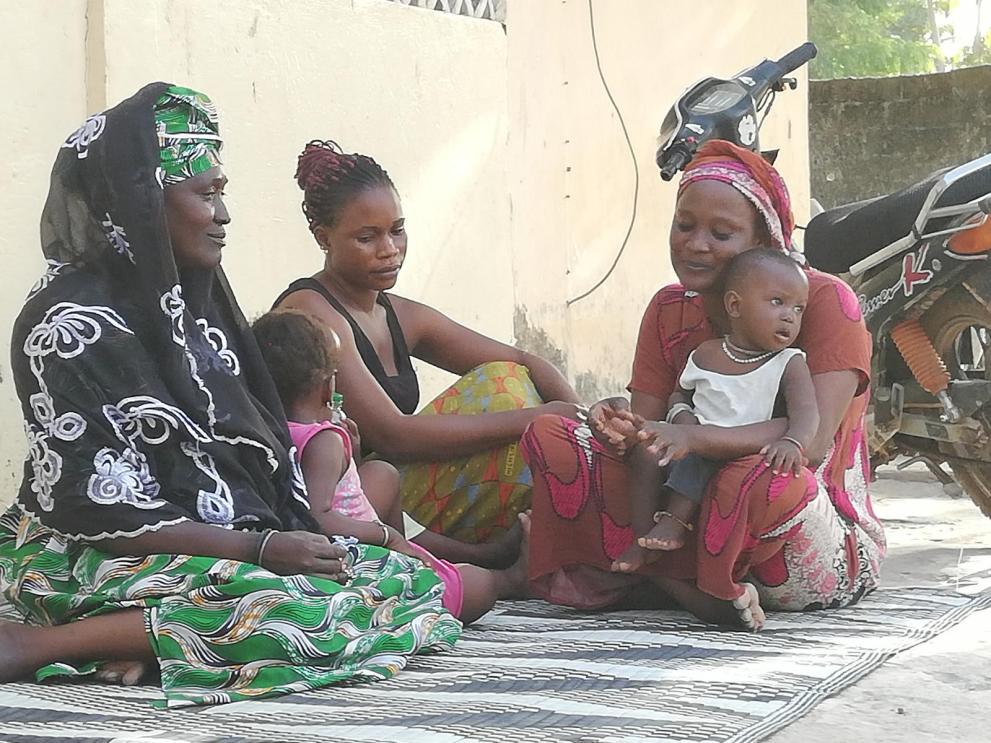
Mariama, 65, lives in Farafenni, an increasingly busy transit point close to the border with Senegal. She says she has 8 adult children and a lot of grandchildren. “Your own children can find themselves on the road migrating for some reason, without their parents. So these vulnerable children need to be well taken care of. How you take care of them reflects on who you are as a family”, she adds. “When children we host leave, I sometimes feel lonely without them”.
Mariama’s family is one of the 8 host families the PROTEJEM project has engaged with in Soma and Farafenni to support its objective of creating a protective environment for children and young migrants through adapted, accessible and quality basic social services. In West and Central Africa, a growing number of children, currently estimated at 9,3 million[1], migrate to escape poverty, violence, exploitation or look for economic opportunities. While the drivers of child migration are most often multi-layered and complex, this exposes them to risks of exploitation, neglect, abuse and trafficking. The regional study on the profiles of Children and Young Migrants conducted in 2021 by the PROTEJEM project with support from the African Bureau of Studies on the Rights of Children (BADE), reveals that The Gambia is a source, transit, and destination country for trafficking in children for sexual purposes as well as for labour exploitation. It also shows that a significant number of children on the move are boys from Koranic schools running away and girls trying to escape gender-based violence including early marriage. Equally important, our study concluded that the number of care services and institutions in The Gambia which could respond to the needs of children on the move where they are is extremely limited and underresourced. Most often, care arrangements are made informally in the communities. Child migrants identified are often handed over to the police. Access to food and accommodation services also poses significant challenges.
Host families serve as a solution for the temporary placement of children and young migrants while solutions are being sought for their reintegration in their families and communities of origin. The PROTEJEM project team has worked with the Ministry of Children, Gender and Social Welfare to develop the country’s first alternative care protocol stipulating the conditions of care provided to children. This is based on a number of key principles such as non-discrimination, confidentiality, accountability and transparency. The best interest of the child is paramount. The protocol also relies on promoting meaningful and safe child participation at every stage of the care process.
A thorough assessment of the selected families was conducted in cooperation with the Department of Social Welfare, members of the Community Child Protection Committees, in addition to background checks by police forces. The families were then registered with the Ministry of Gender, Children and Social Welfare who formally recognized them as host families and monitors them.
According to Alieu Marr, project officer with Save the Children, “we have trained all families on child protection and safeguarding, for instance as regards the specific needs of children on the move including girls’ specific vulnerabilities and helped them become familiar with the protocol’s standards of care to enable an appropriate home environment for the children they host. We are also supporting them with food and mattresses which is very much appreciated”. Fatu whose family in Soma is also supporting the project’s objectives acknowledges that “taking care of a child is a big responsibility. Providing enough food and good accommodation is very important. So far we have only hosted boys, some of which ran away from the poor conditions in the daaras their parents had sent them to. It can happen that one child engages in some bad behaviours like smoking and we need to make sure they stop it and don’t influence the other children in our household”. “The children we host are part of our family, we make no distinction or discrimination in upholding their rights”.
Since 2020 when it started, the PROTEJEM project “Improving the protection of children and young migrants on the main migratory routes in West Africa” has provided direct assistance to 234 children and youth on the move in The Gambia. 76 of these were placed in host families and later reintegrated with their families in Gambia and neighbouring countries. The project is financed by the European Union’s Emergency Trust Fund for Africa and implemented by Save the Children and Terre des hommes in Senegal, The Gambia, Côte d’Ivoire and Guinea.
[1] UNICEF, Reaching out to partners in the time of COVID-19 – Cross-cutting areas Children on the Move, May 2020
Details
- Publication date
- 26 April 2022
- Region and Country
- Guinée
- Côte d'Ivoire
- Senegal
- The Gambia
- Mali
- Burkina Faso
- Niger
- Thematic
- Improved migration management
- Partner
- Save the Children
- Caritas Switzerland
- Croix Rouge Espagnole
